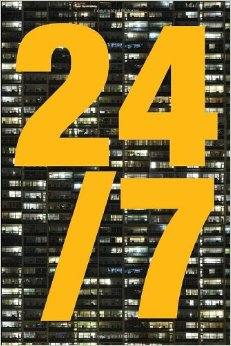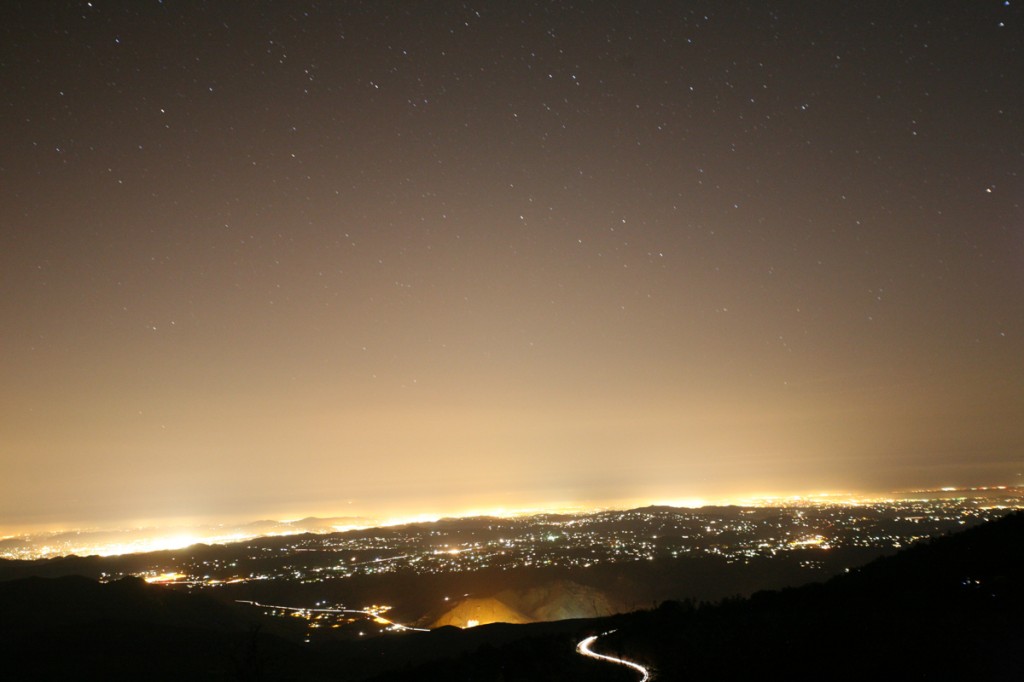
I recently heard on the radio a short program about the night sky. In it they talked about the millennia of writing and cultural expression that have come specifically from an encounter with the darkness of night. The show made the point to say that now, in the age of light pollution and skyglow, the night sky is no longer a continual reminder of human finitude and impermanence: it’s for vacations and camping trips. And with the Night Sky II app (the Lite version is free in the AppStore!), it’s all mappable and nameable anyway. They cited the Wendell Berry poem, “To Know the Dark” to better describe what they meant:
To go in the dark with a light is to know the light.
To know the dark, go dark. Go without sight,
and find that the dark, too, blooms and sings,
and is traveled by dark feet and dark wings.
 Berry’s poetic indistinction here—talking about the “dark” instead of the night—intensifies the point of what the night in general means, or ought to mean, for us. The way Berry describes it highlights the mindfulness, even the faith, our relationship with the nighttime requires. The show seemed to be saying that’s not the case anymore. With city lights, and with a flashlight ever accessible on the backs of our phones, it seems we don’t need to know the dark. Who needs the dark, when the light is always there? And yet, “To go in the dark with a light is to know the light”…what happens to people who never know the dark?
Berry’s poetic indistinction here—talking about the “dark” instead of the night—intensifies the point of what the night in general means, or ought to mean, for us. The way Berry describes it highlights the mindfulness, even the faith, our relationship with the nighttime requires. The show seemed to be saying that’s not the case anymore. With city lights, and with a flashlight ever accessible on the backs of our phones, it seems we don’t need to know the dark. Who needs the dark, when the light is always there? And yet, “To go in the dark with a light is to know the light”…what happens to people who never know the dark?
This immediately brought to mind Jonathan Crary’s 24/7, a short, sharp polemic in defense of the final frontier of…sleep. I say polemic because Crary’s target is the 24/7 marketplace brought on in what he refers to as “late capitalism”—the non-time and no-place generated by the free market. Whether you agree or disagree with the source of Crary’s dispute, his findings on the great migration of sleep are unsettling if not horrifying, not just in the statistics about sleep, but in the ways we’ve begun to conceive of sleep as “time lost.”
What is it about nighttime and sleep? Crary thinks of it as the final remnant of human privacy and vulnerability, almost entirely because it offers nothing to the cult of human productivity. To a world in which more can always be done and more can always be bought or sold, sleep represents opportunity cost. And sleep will always be bartered against and assaulted for the sake of more active, connected, economic exchanges. For Crary, it is not far to suggest sleep is the last sacrament of human need, the use-less and defense-less territory where nothing is achieved and nothing is named.
In its profound uselessness and intrinsic passivity, with the incalculable losses it causes in production time, circulation, and consumption, sleep will always collide with the demands of a 24/7 universe…it is a ubiquitous but unseen reminder of a premodernity that has never been fully exceeded…Sleep is the irrational and intolerable affirmation that there might be limits to the compatibility of living beings with the allegedly irresistible forces of modernization.
Surely, modernization and technological advancements are not all anti-sleep. Crary uses the 1880s invention of streetlights as such an example that quickly made nighttime and “nightlife” a safer option for city community and economic life. At the same time, what those streetlights offered was two-fold: “the twin guarantee of security and increased possibilities for prosperity.” In other words, lighting the streets, being able to observe the streets and the people walking them, created more potential for awake time, but also established the illusion of control: if I can see what’s going on, I will not be anxious about what’s out there.
It’s not that streetlights themselves were geared towards a monolithic non-culture; it’s that streetlights provided a propensity for control that has been perpetuated for over a century since. Now, our nights are filled with what Crary calls a “fraudulent brightness,” the connected, active and observable semblance of day. It seems we are the gods the psalmist cries out for, where “night is not night…but night is as light as day to you” (Ps 139). We have arrived at the numbing realization of Socrates’ “permanent daylight of reason,” where people sleep on average 4 hours less per night than they did just 80 years ago, and even the way we think about our “down time” is rarely considered sleep time.
One seemingly inconsequential but prevalent linguistic figure is the machine-based designation of “sleep mode.” The notion of an apparatus in a state of low-power readiness remakes the larger sense of sleep into simply a deferred or diminished condition of operationality and access. It supersedes an off/on logic, so that nothing is ever fundamentally “off” and there is never an actual state of rest.
…Luc Boltanski and Eve Chaipello have pointed to the array of forces that esteem the individual who is constantly engaged, interfacing, interacting, communicating, responding, or processing within some telematic milieu…In their connectionist paradigm, the highest premium is placed on activity for its own sake, ‘To always be doing something, to move, to change—this is what enjoys prestige, as against stability, which is often synonymous with inaction.’
Crary argues this is not the omega point of the Protestant work-ethic, he calls it a “new model of normativity.” And when this is the new model, when sleeping is not a daily dose of death-and-resurrection but a diminished mode of activity-and-processing, how does that affect the way we see ourselves and the character of God? No doubt, the Divine Accountant easily takes shape, a never-resting, never-forgetting Operator, urging you from your slumber into your higher modes of machinic execution.
And yet, biblically speaking, we are told that God “gives to his beloved sleep” (Ps 127), and Jesus gives the parable of the farmer who, “whether he sleeps or gets up, the seed grows; he knows not how” (Mk 4). To quote another Wendell Berry poem we’ve recounted here, “What hard travail God does in death!” When more than half of Facebook users sign in within minutes of waking up, when shows are streamed at any hour of any night, when the demands of the today slyly encroach upon the post-dinner inbox, who are we to call on? What can be said of this secret world of sleep?
[youtube=https://www.youtube.com/watch?v=azkowKeshB4&w=600]

COMMENTS
4 responses to “For He Gives to His Beloved Sleep (Mode)”
Leave a Reply














I am thankful for the one and only Creator God who is never in “sleep mode”. “…He will not allow [my] foot to slip; He who keeps [me] will not slumber. Behold, He who keeps Israel will neither slumber nor sleep. The LORD is your keeper; The LORD is your shade on your right hand.”
Holy smokes that’s a good post. I love how you slipped the factoid in there that “people sleep on average 4 hours less per night than they did just 80 years ago”. Goodness gracious! And that Mark Olson song (with Gary Louris on backing vocals i believe) is a gem and a half.
People also, on average, work less physical jobs than they did 80 years ago, which I’m guessing likely explains the decrease in sleep.